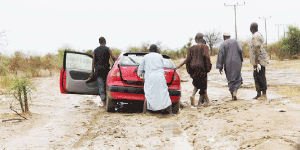PASCAL OPARADA writes on neglected Nigerian communities currently accorded attention on account of disasters that befell them
A muddy road in Chibok
Lisa was virtually an unknown village tucked away in the outskirts of Ogun State before the Belview aircraft crashed on it in 2005. Getting to Lisa before the crash was a herculean task. One would have to meander through many difficult bad roads that could easily pass for death traps.
For instance, the journey to Lisa begins from Ijoko, then to the railway crossing that leads to Oyero, another community known for its masquerade cult. The terrain from Oyero to Lisa used to be like a trip to hell, due to the bad nature of the road. The road was a downward slope that had been adversely affected by erosion. Today, Lisa has been made famous by a natural disaster and, luckily, the government has come to its rescue.
Before the crash, a parcel of land was sold for a pittance, but now many can hardly afford a plot of land in this remote village because it costs millions now to own one.
Just as Lisa, so is Iju-Ishaga. On June 3, 2012, Dana Air passenger plane crashed into that sleepy community, killing over 200 (including crew members) on board and some members of the community. At the time, rescue efforts were daunting because the road leading to the crash site was impassable.
Now, the road has been constructed, stretching from Balogun, off Iju Road all the way to the site. Again, another tale of a place made famous by disaster and only remembered by government when misfortune struck.
And like Lisa, Iju-Ishaga and many other scenes of human disasters, not many Nigerians ever heard of the name Chibok, a community in Borno State, until the April 14, 2014 abduction of more than 200 girls in the area.
Before the abduction, the impression had always been that Borno was mainly populated by Muslims. But the unwholesome kidnapping of the pupils of Government Secondary School, Chibok, who were sitting for their West Africa Examination Council (WAEC) exams, opened the story of the community to Nigerians and the world at large. It thus marvelled many to discover that the people were mainly Christians.
With a population of 66,105 persons, the people of Chibok occupy an area of land approximately 1,350 kilometres. It is a farming community, with really nothing remarkable to attract the attention of the world to it. But the mass abduction in that sleepy community made the world to take notice of it – an unusual way to gain fame.
An online newspaper, Premium Times, reported that there is no access road to Chibok – no single asphalted road in the entire local council area. The paper added that travelling to Chibok is like groping in the dark and that drivers often say, as they and other commuters meander through contoured earth-road, that Chibok road could best be described as footpath or cattle route.
As attention now focuses on the abducted girls, it has also helped frame the narrative of a town and its people so deprived of basic amenities.
Analysts are of the view that the reason many Nigerians were disappointed when President Goodluck Jonathan shelved his plan of visiting this traumatised town was that he lost the opportunity to see the plight of these Nigerians.
“Had the visit taken place, it would have further brought our leaders face-to-face with the abject poverty which many Nigerians are subjected to on daily basis. Chibok should not remain the same after rescuing the girls.
“The question is: must we wait for one form of disaster or misfortune to occur before we can attract government presence?” James Nnabugwu, a public affairs analyst, queried.
Government Secondary School, Chibok, where the abduction took place, is in an isolated place. As at the time the terrorists struck, there was no electricity, basic amenities were lacking, but the students had to make do with that because that is all the government could give them.
“One sure way to fight terror and other vices plaguing our community is to embark on massive development of the rural areas. Chibok will attract a huge local and international presence in terms of infrastructure and social amenities. But we don’t need to wait until disaster strikes before we remember a people,” Nnabugwu added.
He also encouraged the government to hasten efforts in providing social amenities to neglected communities and not waiting for disasters to announce their suffering.














